Seven Years with SOS Humanity: Interview with crewing team member Christina
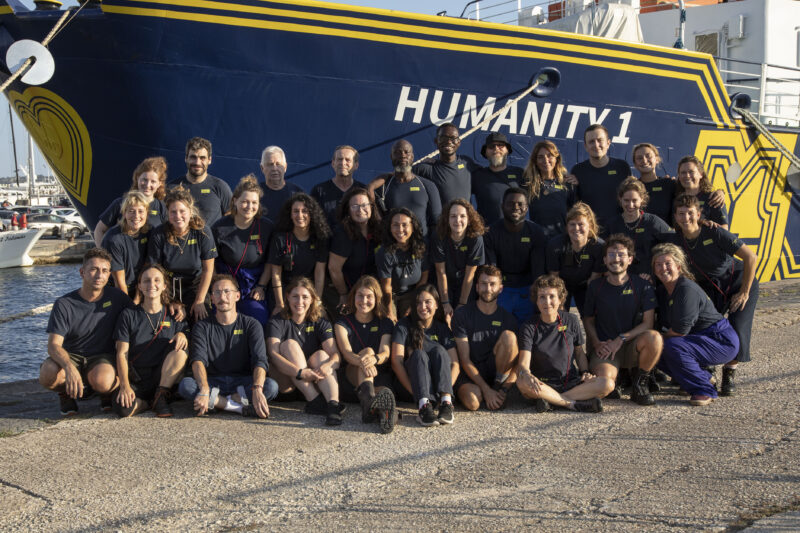
In August 2023, for the first time, the crew on board Humanity 1 consists predominantly of women. On this occasion, we spoke with Christina, one of our crewing team members. She has been a part of SOS Humanity for seven years and is responsible, among other things, for managing applications from volunteers on board. In the interview, she talks about her journey to civil search and rescue (on the Mediterranean), the significance of a diverse crew, and how working with SOS Humanity has changed her life.
Why did you decide to get involved in the civilian search and rescue activities on the Mediterranean and become a part of SOS Humanity?
I was born and raised in East Germany and then lived in Italy from the mid-1990s. After studying film studies, I worked as a freelancer for many years. The topics of migration and refuge were important to me both politically and due to my family history. In February 2016, I was on the Italian island of Lampedusa, researching the topic of “Migration Today – The Mediterranean Route.” A local group of volunteers invited me to come to the port.
This situation deeply moved me. Imagine: Saturday night, full moon over the port, the coast guard boats gradually bringing these mostly young people to land. They stand in a row, covered with shimmering rescue blankets, waiting for hours. Facing them are police officers, carabinieri, and financial guards, all with folded arms and stern expressions, quite confrontational. And in between are the volunteers, welcoming the arrivals with hot tea, biscuits, toys for the children, and a smile.
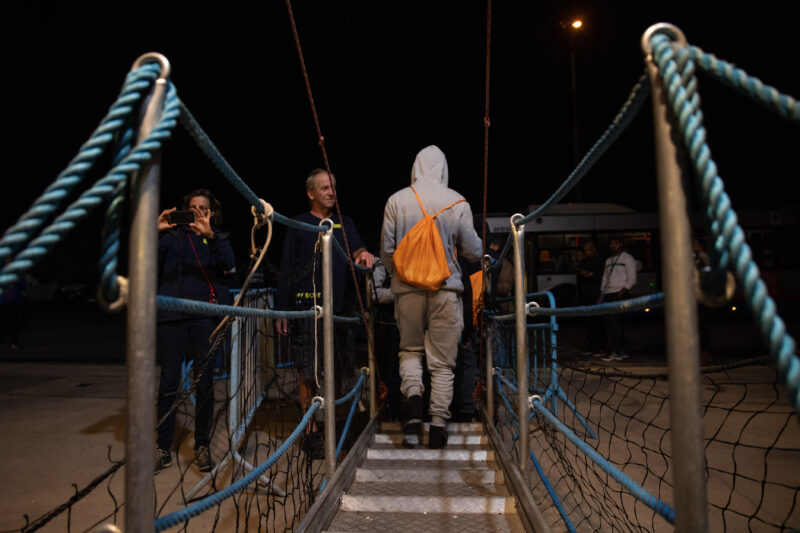
I was present at several port landings after that. One evening, the Aquarius (note: the first ship of SOS Humanity, formerly known as SOS Mediteranee Germany) docked. I had conversations with people who belonged to the first generation of our organisation. When I saw the Aquarius setting out for its first rescue mission, I thought, “I want to be on that ship. This is what I want to do!”
And then you applied?
Exactly. I wrote a short email explaining that I speak Italian and have first aid skills, can clean and cook, whatever is necessary. In June 2016, I went on board. Over the course of a year, I was part of the rescue team on the Aquarius three times. At the end of my first mission, we recovered 22 bodies from a rubber boat and brought them ashore.
Since then, I’ve been a part of SOS Humanity; first as a volunteer, now in a full-time position.
Now you’re a crewing officer responsible for assembling the crew. Your team praises your good “gut feeling.” What do you place special emphasis on when selecting crew members?
We value both professional and personal suitability, as well as motivation and a diverse crew. We want to embody what our name signifies: Humanity, which stands for compassion and humaneness. We aim to have people from different backgrounds and origins on board – but also strive for a balance of women and men. Additionally, there is zero tolerance for racism, sexism, homophobia, or transphobia, that’s clear.
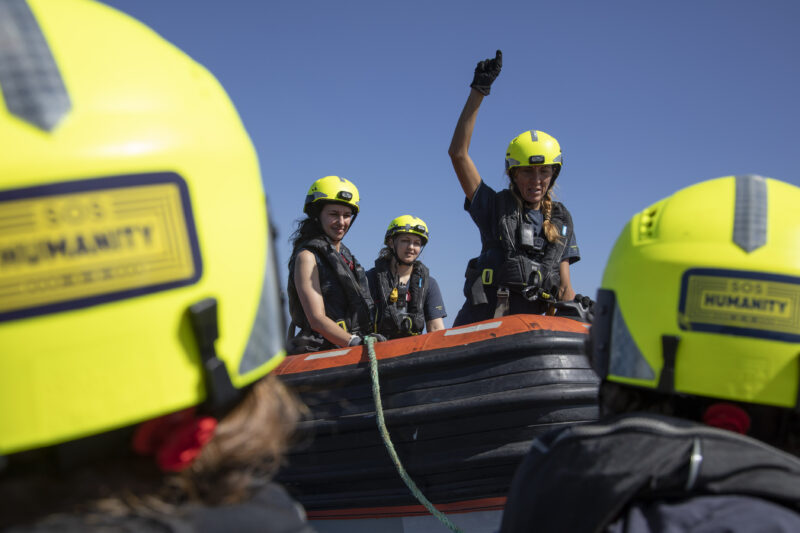
In the current rotation, the crew consists of more women than men. Is this the first time?
Yes, it’s the very first time. This is also due to the fact that maritime work has traditionally been seen as a male-dominated field. “A woman on board brings bad luck” was the attitude of many sailors. Nowadays, we receive many applications from women as well. This is because we don’t only have the nautical crew that operates the ship, but also the operational crew responsible for rescuing and protecting survivors. I’m in charge of these crew members, including the crew of the RHIBs (speedboats), the care team, and the communications team. In these teams, we need, for example, paramedics, doctors, midwives, interpreters, photographers, or psychologists . These people usually don’t have maritime backgrounds; they work or study and support us as volunteers. People from different backgrounds and generations come together.
Does that also pose potential conflicts?
Of course, but we try to counteract that by upholding our principles and values in each mission cycle. We have a FLINTA* group on board that provides additional support to FLINTA* individuals. It’s well received and seen as highly important. Moreover, there are two focal points on board. They are not employed by SOS Humanity but are part of the volunteer crew on board and are points of contact for incidents of sexist or racist nature, or any other inappropriate behaviour.
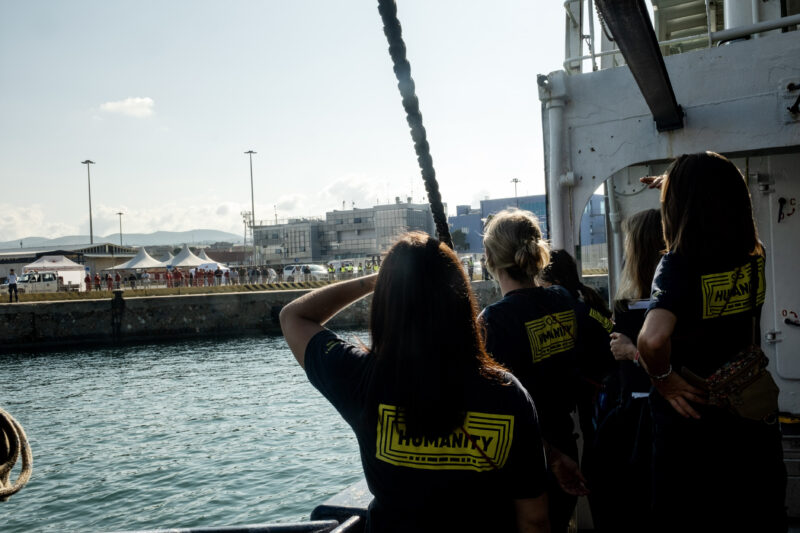
How does it feel to have been involved in civil search and rescue at sea for so long?
It’s been seven years since I started doing this. For me, it’s a gift to work with so many young, motivated, and skilled individuals. This project, our rescue ship, is carried by so many hands – not just the crew on board, but also the team on land and all the supporters, donors, and volunteer groups. So many people contribute their energy, money, and time. That’s why the name, SOS Humanity, fits so perfectly. Because together, as humans with humanity, we’re doing this work as long as it’s necessary.
But, of course, working on board is physically and mentally demanding. At times, you barely sleep for days, and you face high levels of stress, hearing terrible stories, seeing scars and wounds.
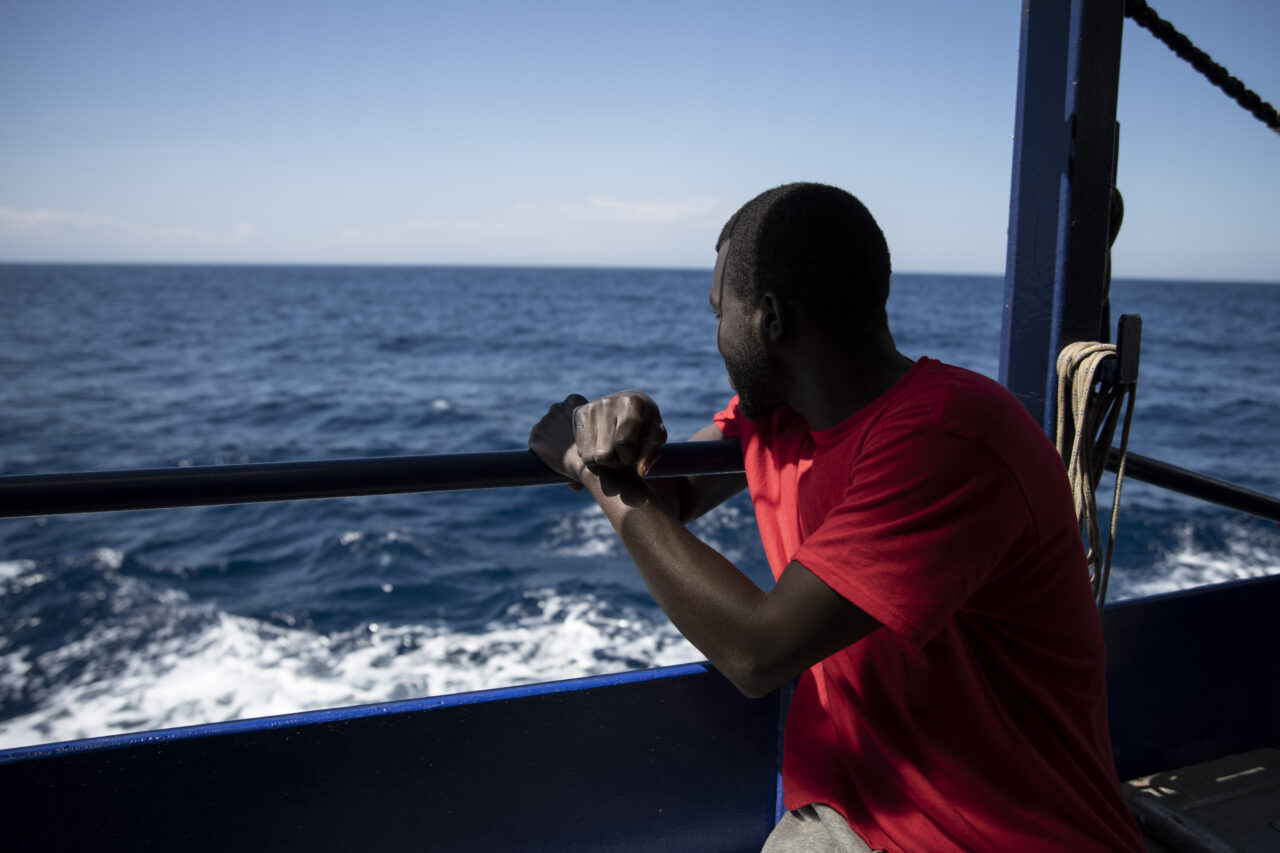
Would you like to share one of those experiences?
There was an encounter – this was in 2017 on the Aquarius – I will never forget. A young man with a thick scar on his forearm told me that he had been tortured in Libya, that his arm had been cut open with a piece of glass, and that the wound was never treated by a doctor. He told me his name, and I later found him on Facebook and followed his journey. He arrived in Italy, found work, got married two years ago, and had a daughter a year ago. It’s rare to be able to follow a person’s story like this, but it’s a very beautiful confirmation of our work. Even though we know that many don’t make it, don’t find a place, can’t truly start a new life in Europe.
Is it difficult for you to accept that you no longer have influence over that?
Yes, that does affect all of us, of course. But primarily, it’s important to me that these people are alive, that they were rescued, that they didn’t drown, that they’re not missing. And then, we have to trust that there are other people, other organisations, that will take care of them.
What do you wish for these people?
I wish for more sensitivity and respect towards these individuals. They are people with a story, a name, a family, dreams, experiences, traumas. I wish for them to be seen as such, not as numbers. And for their rights to be respected. The rights of all refugees, whether they come from Ukraine, Libya, or Tunisia. Because ultimately, it’s about basic human rights and the fact that we are all equal.
And what do you demand from politics?
That they act accordingly and finally take action from a European perspective. We know what’s happening in Libya. We know what’s happening in Tunisia. Yet, nothing is being done, and instead, myths like the pull factor are being discussed. Despite the fact that this has been scientifically debunked many times. It’s proven that NGO ships are not responsible for the number of people fleeing across the Mediterranean. But this is constantly brought up, instead of accepting that this is about human lives. What we’re doing is not special; it’s a normal, humane response. It cannot be that we let people drown. That cannot happen, and I can’t and won’t accept it.


